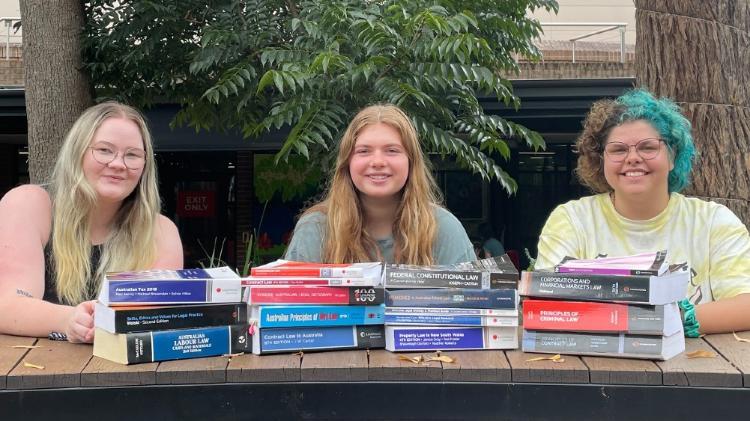March 22, 2022
Working Group on Strategies to Support First Nation Law Students – celebrating activities to date
Improving experiences of Aboriginal and Torres Strait Islander law students at UOW.
In December 2018, UOW staff – from Woolyungah Indigenous Centre, the School of Law and the Pro-Vice Chancellor (Students) Division – met to discuss ways we could work together to improve the experiences of Aboriginal and Torres Strait Islander law students at UOW. That discussion led to the formation of the Working Group on Strategies to Support First Nation Law Students.
The first thing the group did was to survey the needs of First Nation law students at UOW. Students shared a range of needs connected to academic, social, professional, financial and cultural support. We then brainstormed ideas to address those needs, categorising each idea as either a short, medium or long-term goal.
Today, we are proud to share some of the ideas that we have implemented so far.
For academic support, the School of Law and Woolyungah Indigenous Centre began working closely together to source peer tutors for the Indigenous Tailored Academic Program. We stopped sending out generic emails to all students when a First Nation student needed a tutor for a particular subject, and instead reached out personally to students who had already completed that subject with Distinction. Building on the enthusiastic response of the students we reached out to, we now personally invite our highest performing students to tutor into the program at the beginning of each year.
For social support, we responded to student survey responses on the value of peer mentors by extending the existing UOWx peer mentor program run by Woolyungah Indigenous Centre to include a law-specific stream. First piloted in 2020 (during the pandemic), the program has so far connected six first year law students with six later year law students. An example of the power of this program is how one mentor assisted their mentee to apply for and secure a prestigious internship with Legal Aid NSW.
For professional support, students expressed a desire for more opportunities to connect with the legal industry, especially upper year students looking to transition out of university. Here, we re-established our connection with the NSW Bar Association Indigenous Barristers Trust. Now, each year, we individually invite students to apply for the Trust’s First Nation Law Student mentoring scheme. So far, the Trust has connected five students with a barrister or judge mentor. Re-establishing our relationship with the Trust also led to two First Nation law students receiving a full scholarship to attend the National Indigenous Legal Conference in Darwin in 2019, and part time job offers for two other students.
For financial support, students especially wanted alternative ways to access the expensive law textbooks. In 2019, we secured funding to buy the first year texts for commencing First Nation law students. Realising this funding might not come every year, the Working Group recently asked the publishers of all our prescribed textbooks to provide free texts to form part of a textbook library where students return their textbooks to Woolyungah Indigenous Centre at the end of each semester, making them available for another student to use.
Student survey responses also emphasised the need for cultural support, especially in the classroom and curriculum. Recent Working Group highlights here include the design of a new outreach workshop that asks high school students to consider invasion through the lens of colonial criminal laws, and the recommencement of the law elective, Indigenous Peoples and Legal Systems, taught in 2021 by an Awabakal lawyer. We also established a school-level sub-committee of the Working Group in July 2020. The sub-committee allows more staff from the School of Law to invest in the goals of the Working Group. Its primary task is to consider ways we can respectfully embed the knowledges, experiences and perspectives of First Nations people into our curriculum. Planned activities to advance this goal in 2022 include:
- Auditing our curriculum to see where and how the experiences, knowledges and perspectives of First Nation peoples are currently included
- Supporting staff to complete the training modules produced by the Australian Institute of Aboriginal and Torres Strait Islander Studies
- Joining local Elders in a discussion around the yarning circle at Woolyungah Indigenous Centre
We are proud of the small things we have accomplished over the past three years. The collective impact of these small things is a strong foundation from which to build a sustainable suite of strategies to support the diverse needs of First Nation law students at UOW. Thank you for reading about our journey so far. We look forward to sharing more with you over the coming years.
Current members of the Working Group on Strategies to Support First Nation Law Students are:
- Joel Keen (Co-Chair, Associate Lecturer, Indigenous Tailored Academic Support Officer, Woolyungah Indigenous Centre)
- Kylie Lingard (Co-Chair, Senior Lecturer and Head of Students, School of Law)
- Jaymee Beveridge (Executive Director of Indigenous Strategy and Director of Woolyungah Indigenous Centre)
- Adam Ridgeway (Indigenous Student Success Specialist, Woolyungah Indigenous Centre),
- Caitlin Stuart (Student Employability and Engagement Coordinator, Woolyungah Indigenous Centre)
- Wendy Firth (Manager of Student Partnerships and Transitions, Pro Vice-Chancellor (Students) Division)
- Trish Mundy (Dean of Law, School of Law)
- Sarah Ailwood (Senior Lecturer, School of Law)
The Associate Dean for Equity, Diversity and Inclusion for the Faculty of Business and Law, Shamika Almeida, is also invited to meetings.
Current members of the Sub-committee are:
- Joel Keen (Co-Chair, Woolyungah Indigenous Centre)
- Kylie Lingard (Co-Chair, School of Law)
- Ryan Kernaghan (First Year Coordinator, School of Law)
- Niamh Kinchin (Discipline Leader, School of Law)
- Nan Seuffert (Director of the Legal Intersections Research Centre, School of Law)
- Sarah Wright (Senior Lecturer, School of Law)
- Dora Anthony (Senior Lecturer, School of Law)
